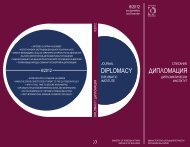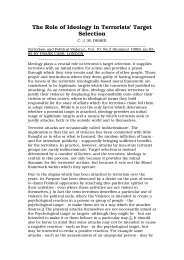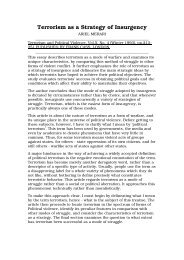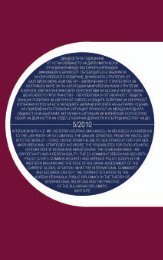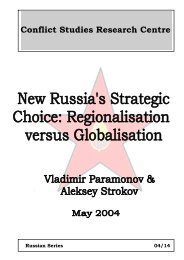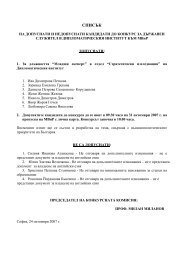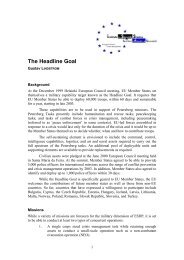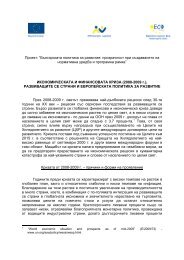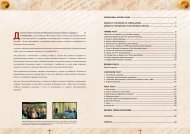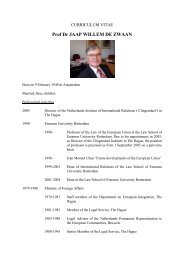The Myth of Ethnic Conflict: Chap 13 - Diplomatic Institute
The Myth of Ethnic Conflict: Chap 13 - Diplomatic Institute
The Myth of Ethnic Conflict: Chap 13 - Diplomatic Institute
You also want an ePaper? Increase the reach of your titles
YUMPU automatically turns print PDFs into web optimized ePapers that Google loves.
496 Maria Todorova<br />
This population occupies an intermediate position between the<br />
Bulgarians and the Turks. Neither fish nor meat. And now it prefers<br />
to join the Turks because the Bulgarians devastated it, they<br />
battered it, didn’t give it a chance to exist. 94<br />
<strong>The</strong>se same motives have given some acceptance to the message <strong>of</strong><br />
the Arab missionaries mentioned above. Laughable as it may seem,<br />
their arguments have received some attention for at least two reasons.<br />
First, they confer to the exponents <strong>of</strong> this belief a proper identity<br />
in the face <strong>of</strong> both Bulgarians and Turks, who look down upon<br />
them even when they try to blend into their communities; second,<br />
they furnish them with “their own” cultural and political protectors<br />
from the Muslim world. 95<br />
This last element—a strong outside protector—is a very important<br />
component, present in practically all efforts to articulate a collective<br />
cultural or political identity. <strong>The</strong> Bulgarian Muslims who<br />
wish to enter the Turkish ethnic group look to Turkey for economic<br />
and social salvation; Burov’s Pomak party very definitely wants to<br />
enlist American patronage; even Sarîev’s endeavor to bring the Pomaks<br />
back to their “Bulgarian roots” looks to the Vatican for support.<br />
Although his religious movement converts Bulgarian Muslims to<br />
Orthodoxy, it recognizes the supremacy <strong>of</strong> the Pope, not the Bulgarian<br />
Patriarch. <strong>The</strong> reason, according to Sarîev, is that this is the only<br />
way to alert foreign public opinion about the problems <strong>of</strong> the Bulgarian<br />
Muslims, which, over the course <strong>of</strong> a century, no one in Bulgaria<br />
has either managed or really wished to solve. <strong>The</strong> authority <strong>of</strong><br />
the Vatican would stand as a strong guarantee that this process <strong>of</strong><br />
grassroots conversion to Christianity would remain irreversible. 96<br />
<strong>The</strong> involvement <strong>of</strong> the foreign policy factor serves as an especially<br />
aggravating influence on the ethnic question. As a small and<br />
weak country which reappeared on the European scene only during<br />
the past century, Bulgaria has always felt extremely vulnerable to<br />
outside pressures. Particularly strong has been the “by-now stereotyped<br />
sense <strong>of</strong> threat from Turkey from the outside, and that <strong>of</strong> the<br />
Islamic minorities on the inside.” 97 This is exacerbated at present by<br />
a multitude <strong>of</strong> additional causes: first and foremost, the collapse <strong>of</strong><br />
the Warsaw Pact as a guarantee for Bulgarian security and attempts<br />
by the country to find its place in the European security system free<br />
from the status <strong>of</strong> a Soviet/Russian client state; an increased tendency



